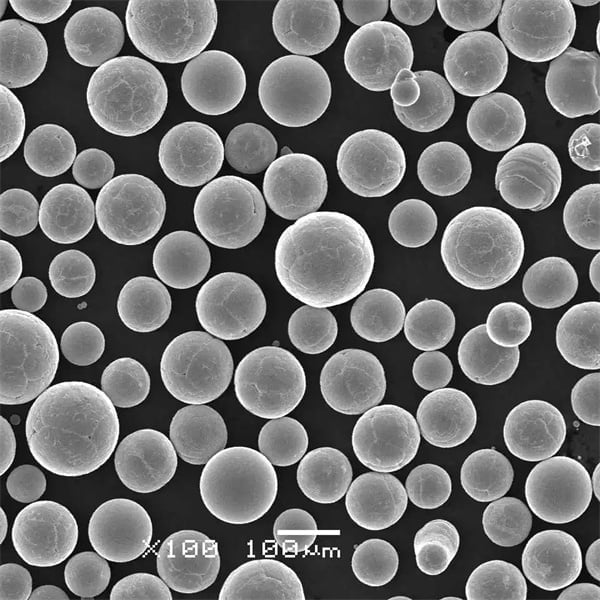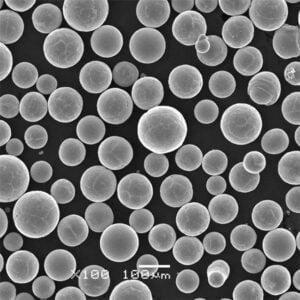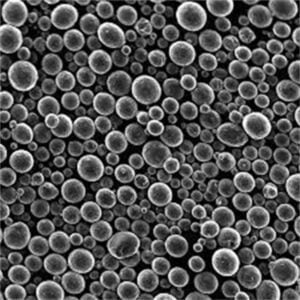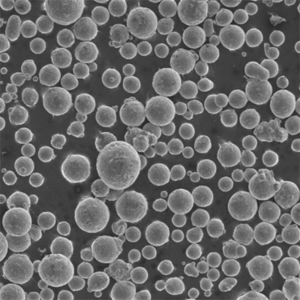Aluminium AlMgSi Pulver
Aluminium AlMgSi pulver är ett aluminiumlegeringspulver som innehåller magnesium och kisel som sina viktigaste legeringselement. Den är känd för sin goda hållfasthet, korrosionsbeständighet och bearbetbarhet.
Låg MOQ
Tillhandahålla låg minsta orderkvantitet för att möta olika behov.
OEM & ODM
Tillhandahålla kundanpassade produkter och designtjänster för att tillgodose unika kundbehov.
Tillräckligt lager
Säkerställa snabb orderhantering och tillhandahålla tillförlitlig och effektiv service.
Kundtillfredsställelse
Tillhandahålla högkvalitativa produkter med kundnöjdhet i fokus.
dela denna produkt
Innehållsförteckning
Översikt
Aluminium AlMgSi pulver är ett aluminiumlegeringspulver som innehåller magnesium och kisel som sina viktigaste legeringselement. Den är känd för sin goda hållfasthet, korrosionsbeständighet och bearbetbarhet.
Some key properties and characteristics of Aluminium AlMgSi powder include:
Aluminium AlMgSi Powder Properties
| Fastighet | Beskrivning |
|---|---|
| Sammansättning | Aluminium with 0.5-1.5% Mg and 0.5-1.3% Si |
| Täthet | 2.66-2.70 g/cc |
| Smältpunkt | Around 580-650°C |
| Styrka | Higher than pure Al powder |
| Motståndskraft mot korrosion | Good due to Mg and Si alloying additions |
| Konduktivitet | Excellent electrical and thermal conductivity, close to pure Al |
| Användbarhet | Excellent machinability and formability |
AlMgSi aluminium powders find a wide range of applications owing to their well-balanced set of properties. They offer higher strength than pure aluminium while retaining the metal’s low density, excellent corrosion resistance, conductivity, and workability.
The magnesium and silicon present as alloying elements in AlMgSi powder impart strength through precipitation hardening and solid solution strengthening mechanisms. The composition is tailored to provide optimized properties required for specific applications across industries.
Aluminium AlMgSi Powder Composition
AlMgSi aluminium alloy powders have a typical composition of 0.5-1.5% Magnesium and 0.5-1.3% Silicon, with aluminium constituting the balance.
Other alloying elements may be present in small amounts or intentionally added to tweak certain properties. These could include elements like iron, manganese, chromium etc.
The table below shows the broad composition range:
Typical Composition of Aluminium AlMgSi Powder
| Element | Vikt % |
|---|---|
| Aluminium (Al) | Balans |
| Magnesium (Mg) | 0.5 – 1.5% |
| Kisel (Si) | 0.5 – 1.3% |
| Other elements | < 1% total |
The ratio of magnesium and silicon is balanced to maximize strength through precipitation hardening while avoiding any detrimental reductions in ductility, fracture toughness or corrosion resistance.
Varying the individual and relative percentages of the alloying elements creates sub-variations of the AlMgSi grade optimized for more specific applications. For example, an AlMg1SiCu powder tailored more for welding or an AlMg0.8Si for high pressure die casting.
Controlling impurities like iron at low levels is also critical to achieve the desired powder characteristics. Special production techniques and stringent raw material selection is involved to keep impurities in check.
Production Method for AlMgSi Aluminium Powder
AlMgSi aluminium alloy powder can be manufactured using different techniques:
- Atomisering: Molten AlMgSi alloy is disintegrated into fine droplets using gas or water which rapidly solidify into powder. This yields high purity powder suited for additive manufacturing or MIM.
- Mechanical Milling: Ball milling of AlMgSi ingots or chips/turnings to produce powder through cold welding and fracturing. Lower cost but powder particles have some contamination.
- Electrolytic Process: Anodic dissolution of AlMgSi alloy to produce powder through electrolysis. Powders are angular, suited for thermal spraying.
Each process results in powders of different particle shape, size distribution, oxygen/nitrogen pick-up, and production economics. The table below summarizes the comparison:
Comparison of AlMgSi Powder Production Methods
| Parameter | Atomisering | Mekanisk fräsning | Elektrolys |
|---|---|---|---|
| Partikelform | Sfärisk | Oregelbunden, kantig | Angular, crystalline |
| Partikelstorlek | 10 - 150 mikrometer | 20 microns + | Up to 100 microns |
| Oxygen Pick-up | 0.05 – 0.15% | 0.2% + | 0.4% + |
| Nitrogen Pick-up | 0.005 – 0.015% | 0.05% + | Negligible |
| Kostnad | Hög | Låg | Medium |
Atomized AlMgSi powders offer superior properties but are more expensive. The suitable production method is selected based on the application requirements and economics.
Properties of AlMgSi Aluminium Alloy Powder
Some of the key properties of Aluminium AlMgSi powder are:
Properties of AlMgSi Aluminium Powder
| Fastighet | Värden |
|---|---|
| Täthet | 2.66 – 2.70 g/cc |
| Smältpunkt | Around 580-650 deg C |
| Termisk konduktivitet | 130-160 W/m.K |
| Elektrisk konduktivitet | 30-35% IACS |
| Koefficient för termisk expansion | 21-24 x 10<sup>-6</sup>/K |
| Elasticitetsmodul | 70-80 GPa |
| Poissonförhållande | 0.33 |
| Töjning | 8-15% |
| Draghållfasthet | 170-310 MPa |
| Utbyteshållfasthet | 110-205 MPa |
The density, thermal conductivity, and electrical conductivity values are very close to pure aluminium powder. However, the strength properties are significantly higher owing to magnesium and silicon’s alloying effect.
The alloy powder also retains excellent corrosion resistance in various environments and good workability for further processing through extrusion, forging, rolling etc.
Overall, AlMgSi powder delivers an optimized combination of medium strength, light weight, formability, thermal conductivity and corrosion resistance required in its intended applications.
Applications of Aluminium AlMgSi Powder
The applications of AlMgSi alloy powder span across automotive components, general engineering, consumer appliances, heat sinks electronics, and rapid manufacturing sectors.
Some major application areas are:
Applications of AlMgSi Aluminium Powder
| Industry/Sector | Exempel på tillämpningar |
|---|---|
| Fordon | Engine blocks, pistons, gears, shafts, valves |
| Flyg- och rymdindustrin | Airframe components, aircraft fittings |
| Förpackning | Seamless aluminium containers |
| Consumer appliances | Housings, covers |
| Elektronik | Heat sinks, electrical contacts |
| Additiv tillverkning | 3D printed components |
The lightweight, strong, conductive, and corrosion resistant powder is valued across high-performance and demanding applications.
Key drivers for use are:
- Replacing heavier metals like steel and cast iron
- Improved fuel efficiency in transport
- High thermal conductivity for heat removal
- Dimensional stability across operating temperatures
- Resistance to weathering, fuels, oils and weak acids
AlMgSi powders match these requirements while affording excellent fabrication, joining, and machining behavior.
Aluminium AlMgSi Powder Specifications
Aluminium AlMgSi powders are available under various standard classifications or custom specifications tailored to user requirements.
Some common standards for composition, testing methods, and conformance criteria include:
Standard Specifications for AlMgSi Alloy Powder
| Standard | Beskrivning |
|---|---|
| ASTM B602 | Chemical compositions and forms of aluminum alloy powders |
| ISO 13388 | Gas atomized aluminium alloy powders for MIM |
| EN 1706 | Requirements for wrought AlMgSi alloys |
| BS L168 | Chemical composition of Al-alloys |
| DIN 1725 | Designation system for Al-casting alloys |
Specifications would list out the permissible content ranges for alloying and impurity elements, powder particle size distribution, aspects like spherical morphology and minimal satellite content for atomized powder, loose bulk density range, flow rates etc.
Acceptance testing procedures and certificate of conformance are also detailed to ensure powder quality as per applicable codes. Customers may have their own internal standards too aligned with the end application.
Aluminium AlMgSi Powder Manufacturers
Some of leading global producers of AlMgSi aluminium alloy powders are:
Key Manufacturers of AlMgSi Alloy Powder
| Företag | Produktionskapacitet | Manufacturing Process Used |
|---|---|---|
| Hoeganaes Corporation | 30,000 metric tonnes per year | Atomisering |
| RCIM | 20,000 metric tonnes per year | Atomisering |
| Luxfer MEL Technologies | 10,000 metric tonnes per year | Atomisering |
| Sandvik Osprey | 5,000 metric tonnes per year | Atomisering |
| Alpoco Ltd. | 3,000 metric tonnes per year | Mekanisk fräsning |
These companies offer AlMgSi powders under various brand names and customized specifications. Manufacturers also undertake additional value additions like sieve classification, blending, thermal treatments etc. according to the application demands.
Aluminium AlMgSi Powder Pricing
The price of AlMgSi aluminium alloy powder depends on factors like:
Determinants of AlMgSi Powder Pricing
| Faktor | Beskrivning | Påverkan på priset |
|---|---|---|
| Produktionsmetod | Atomization is more expensive than mechanical production | Atomized powder is costlier |
| Renhetsnivåer | Tighter control on alloy chemistry and lower impurities increases cost | High purity grades are pricier |
| Powder Shape/Morphology | Irregular powder is cheaper compared to spherical/granulated | Cost increase from irregular to spherical shape |
| Fördelning av partikelstorlek | Tighter screening to narrow distribution costs more | Prices rise for fine and tightly sized fractions |
| Beställning Antal | Prices reduce for bulk order quantities due to economy of scale | Unit prices drop significantly above 1 tonne |
| Ytterligare bearbetning | Added steps like annealing, blending, disintegrator milling etc. increase cost | More processing equals higher price |
| Certifiering | Medical, aerospace certification testing adds cost | Certified grades are 20-30% pricier |
For metric tonne scale enquiries, approximate price ranges are:
Price Ranges for AlMgSi Alloy Powder Supply
| Parameter | Indikativ prissättning |
|---|---|
| Irregular milled powder | $2-4 per kg |
| Atomized powder | $6-10 per kg |
| Specialty grades for AM | $12-15 per kg |
| High purity medical powder | $25 per kg + |
The pricing tends to be higher for fine powder suitable for additive manufacturing compared to powder for pressing and sintering.
Pros and Cons of Aluminium AlMgSi Powder
Some of the advantages and limitations of Aluminium AlMgSi powder include:
AlMgSi Aluminium Powder – Pros and Cons
| Proffs | Nackdelar |
|---|---|
| Lightweight, density only ~2.7 g/cc | Lower hardness and wear resistance than ferrous alloys |
| Utmärkt förhållande mellan styrka och vikt | Sensitive to high temperature prolonged use |
| God korrosionsbeständighet | Not suited for highly stressed load-bearing applications |
| Hög termisk och elektrisk ledningsförmåga | Oxide concerns in powder handling/storage |
| Excellent machinability and polishing | Limited operate temperature range up to around 300°C |
| Very good manufacturing formability – extrusion, rolling etc | Costlier than competing steel powders |
| Recyclable material | Dust explosion hazards require inert gas handling |
| Softer on machining tools than steel | Fire and molten metal explosion hazards require precautions |
For many applications, the positives of light weight, good strength, thermal properties and processibility outweigh the limitations as long as the operating conditions are suitable.
Comparison With Alternate Materials
How does Aluminium AlMgSi powder compare against some alternate material choices for metal powder applications?
AlMgSi Powder Compared to Alternate Metal Powders
| Parameter | AlMgSi Powder | Rostfritt stål | Verktygsstål | Titan |
|---|---|---|---|---|
| Täthet | 2,7 g/cc | 8 g/cc | 8 g/cc | 4,5 g/cc |
| Styrka | Medium | Högre | Mycket hög | Medium |
| Hårdhet | Låg | Hög | Mycket hög | Medium |
| Motståndskraft mot korrosion | Utmärkt | Utmärkt | Måttlig | Utmärkt |
| Termisk konduktivitet | Utmärkt | Dålig | Måttlig | Låg |
| Elektrisk konduktivitet | Utmärkt | Dålig | Dålig | Låg |
| Kostnad | Låg | Hög | Mycket hög | Mycket hög |
For most applications, AlMgSi offers the best balance of properties and economic viability. It hits the sweet spot between density, strength, conductivity and ease of fabrication.
Steels and titanium have their niche high-performance uses where strength and temperature capability overrides, despite their higher densities. Specialist grades then bring the cost equation into play too.
Vanliga frågor
Frequently Asked Questions on AlMgSi Aluminium Alloy Powder
Q: What is the chemical composition of AlMgSi powder?
A: The typical composition by weight is 0.5-1.5% Magnesium, 0.5-1.3% Silicon with aluminium constituting the balance. Mg and Si additions impart significant strengthening.
Q: What is the density of AlMgSi alloy powder?
A: Density values range from 2.66 g/cc to 2.70 g/cc, which makes this a lightweight structural material.
Q: What are the key characteristics and benefits of AlMgSi powder?
A: It offers an excellent combination of medium strength, low weight, good corrosion resistance, high thermal and electrical conductivity, excellent machinability, weldability, recyclability, and reasonable cost.
Q: What are the typical applications of AlMgSi alloy powder?
A: Major application areas are automotive components like engine blocks, pistons and airframe parts due to high strength-to-weight ratio. Also used in general engineering, consumer appliances, heat sinks requiring heat dissipation.
Q: What production methods can manufacture AlMgSi powder?
A: Main methods are gas or water atomization, mechanical milling and electrolytic process. Each yields powder of different particle characteristics suited to powder pressing or AM.
Q: What affects the pricing of AlMgSi aluminum alloy powder?
A: Pricing depends on production method purity, powder size/shape, order quantity, additional processing, and industry certifications required. Cost increase from milled < atomized < specialty grades.
Q: Is Aluminium AlMgSi suitable for high temperature applications?
A: No, AlMgSi alloy powder has an operating temp limit of around 300 deg C. Requires heat resistant alloys beyond this range. Excellent thermal conductivity though.
Få det senaste priset
Om Xmetto
Produktkategori
HOT SALE
KONTAKTA OSS
Har du några frågor? Skicka oss meddelande nu! Vi kommer att betjäna din begäran med ett helt team efter att ha fått ditt meddelande.








